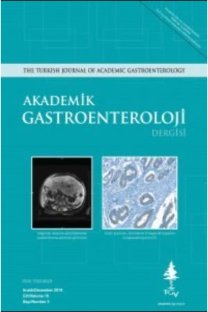Yanıkta mide mukoza hasarı üzerine antitrombin III'ün etkisi: Ratlarda deneysel çalışma
Yan›k, gastrik mukoza, antitrombin III
The effect of antithrombin III on gastric mucosal injury in burn: An experimental study in rats
Burn, gastric mucosa, antithrombin III,
- ISSN: 1303-6629
- Yayın Aralığı: 3
- Başlangıç: 2002
- Yayıncı: Jülide Gülay Özler
Aktif hidrojen iyonlarının gastroduodenal mukozadaki yeri*
Zeygam SÜLEYMANOV, Ali ÖZDEN, Burhan ŞAHİN
Akut pankreatit ve trombotik trombositopenik purpura birlikteliği: Vaka sunumu
Filiz AKYÜZ, Ümit AKYÜZ, Sadakat ÖZDİL, Sinan KILIÇ, Şebnem KALAYCI, Tanju ATAMER, Güngör BOZTAŞ
Özgün Görüntüler İçeri kaçmış plastik biliyer stentin Soehendra stent çıkartıcı ile çıkartılması
Bahattin ÇİÇEK, Mehmet DURSUN, Mehmet ARHAN, Erkan PARLAK, Burhan ŞAHİN
Çocukluk çağı akut ve perfore apandisitlerinde ultrasonografik bulguların tanı değerleri*
Cüneyt GÜNŞAR, İrfan KARACA, Haluk CEYLAN, Barlas ETENSEL, Aydın ŞENCAN, Gülcan Güder ÇETİN, Nazihat KIZILAY, Erol MİR
Hepatit C virus infeksiyonlu hastalarda hepatit B virus sıklığı
Çetin KARACA, Yılmaz ÇAKALOĞLU, Kadir DEMİR, Sadakat ÖZDİL, Sabahattin KAYMAKOĞLU, Selim BADUR, Atilla ÖKTEN
Özgün Görüntüler Koledokoduodenostomi darlığına stent yerleştirilmesi: 1 yıl sonra...
Erkan PARLAK, Bahattin ÇİÇEK, Şemnur BÜYÜKAŞIK, Aydın Şeref KÖKSAL, Mehmet DURSUN, Burhan ŞAHİN
Kronik hepatit C’li hastalarda MRI ile abdominal lenfadenopati sıklığının araştırılması
Necati YENİCE, Alaaddin AVCUL, Celale DURGUT, Yasemin GÖKTEN, Nursen ARICAN, Nevzat AKSOY
Kronik hepatit B ve kronik hepatit C'li hastaların eşlerinde HBsAg ve anti-HCV seroprevalansı
Necati YENİCE, Muammer CANSIZ, Nursen ARICAN, Yasemin GÖKTEN, Celale DURGUT, Sembol TÜRKMEN
Yanıkta mide mukoza hasarı üzerine antitrombin III'ün etkisi: Ratlarda deneysel çalışma
Mustafa YILMAZ, Özkan HEREK, Neşe DEMİRKAN
Pankreasın solid psödopapiller tümörü: Düşük malign potansiyelli karsinoma (2 Olgu)
